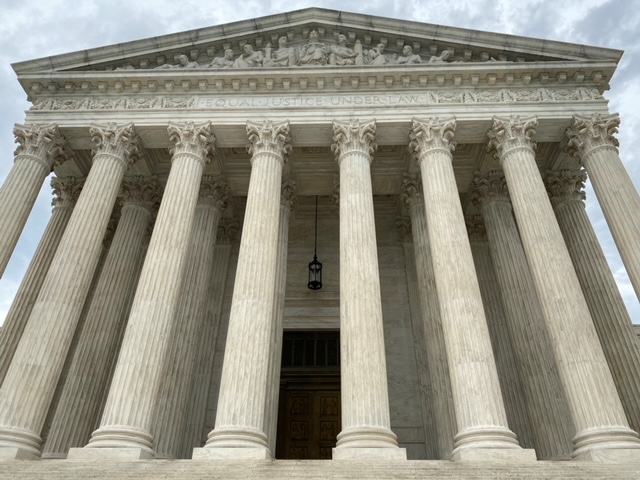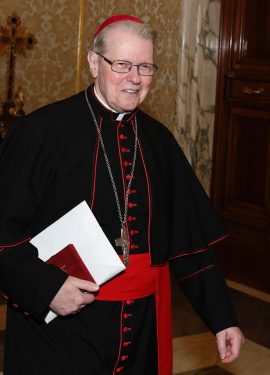
WINDSOR TERRACE — The Diocese of Albany, and 13 other petitioners, including Catholic Charities of Brooklyn and Queens, have asked the U.S. Supreme Court to hear their case opposing New York’s abortion coverage mandate.
At issue is the New York Department of Financial Services’ order that requires employers to cover abortions in their employee health insurance plans.
The state granted a religious exemption to the rule in 2017, but the petitioners claim it is too narrow to effectively exempt agencies that serve or employ people of different faiths.
Bishop Edward Scharfenberger of Albany, who has deep ties to the Diocese of Brooklyn, has been a leading voice in this religious freedom case.
The bishop, a native of Queens, was pastor of St. Matthias Church in Ridgewood from 2003-2014. He was unavailable for comment, but in a statement about the petition, Bishop Scharfenberger wrote that the abortion mandate affects not just Catholics but all faiths that hold human life sacred.
“There is far too much at stake in terms of religious liberty and freedom of conscience to allow this to stand,” Bishop Scharfenberger stated. “We cannot relent on a matter that affects the dignity of all human lives.”

Also petitioning the court is the Diocese of Ogdensburg in northern New York, three state Catholic Charities agencies, the Anglican sisters, and Baptist and Lutheran churches.
The petition, filed in late April, claims the state of New York’s abortion mandate forces religious organizations to ignore their core values.
“Some of the Petitioners are service organizations,” the petition stated. “For instance, three subdivisions of Catholic Charities (Albany, Ogdensburg, and Brooklyn) provide ‘human service programs’ including ‘adoptions, maternity services,’ and ‘programs covering the whole span of an individual’s life,’ as part of the ‘charitable and social justice ministry’ of the Catholic Church.”
“All of these organizations are religiously opposed to abortion; no one has questioned the sincerity of those beliefs,” the document continues.
It also notes, “The Church has taught and believes that ‘modern genetic science offers clear confirmation,’ that from the moment of conception, a new living person exists. The other petitioners share similar beliefs.”
Refusing the mandate comes with the risk of incurring crippling financial penalties, perhaps millions of dollars a year, said Eric Baxter, senior counsel at Washington D.C.-based law firm, The Becket Fund for Religious Liberty, representing the plaintiffs.
The lawyers assert in the petition that the mandate’s religious exemption applies to organizations and their employees who are all members of the same faith.
“But religious organizations that have a broader purpose, such as serving the poor, or that employ or serve members of other faiths or no faith, must cover abortions in their health plans,” the petition stated.
The mandate, therefore, violates the religion clause in the First Amendment of the U.S. Constitution, the petitioners assert.

In “Diocese of Albany v. Lacewell,” the diocese and other plaintiffs sued the state over the exemption in 2017 but lost. An appeal was filed with the State of New York Supreme Court Appellate Division, which ruled in favor of the state last July. The defendant is Linda A. Lacewell, superintendent of the state’s Department of Financial Services (DFS).
“The Court recognized that the regulation was properly promulgated and was well within the expertise and authority of the superintendent,” Lacewell said. “DFS will continue to protect the Constitutional rights of New Yorkers to access services and in support of Gov. (Andrew) Cuomo’s leadership on securing access to reproductive health services in New York.”
Likewise, the diocese and its co-plaintiffs refuse to give up, hence their petition to the U.S. Supreme Court.
The lawyers indicated legal precedence is on their side. For example, Little Sisters of the Poor sued to avoid having to comply with a 2011 mandate from the U.S. Department of Health and Human Services for employers to cover controversial contraceptives and abortifacients in their health care plans. Ignoring the mandate could have brought crushing fines, but the Little Sisters prevailed, winning three battles at the U.S. Supreme Court.
“When New York instituted its abortion mandate, the Little Sisters of the Poor were already two Supreme Court victories into their battle against the contraceptive mandate,” said Lori Windham, senior counsel at Becket.
“Now they’ve won for a third time,” Windham added, “sending the clear message that the government can’t make nuns do its dirty work. The Court needs to step in and teach New York that lesson.”
Bishop Scharfenberger, who is a lawyer with specialties in canon and civil law, also expressed optimism.
“The freedom to choose to protect life is being violated by unconstitutional regulations forcing the insured to pay for its destruction,” he said. “We are confident that the Supreme Court will preserve our right to practice our faith and fulfill our mission, according to our beliefs, and not according to the whims of the state.”
